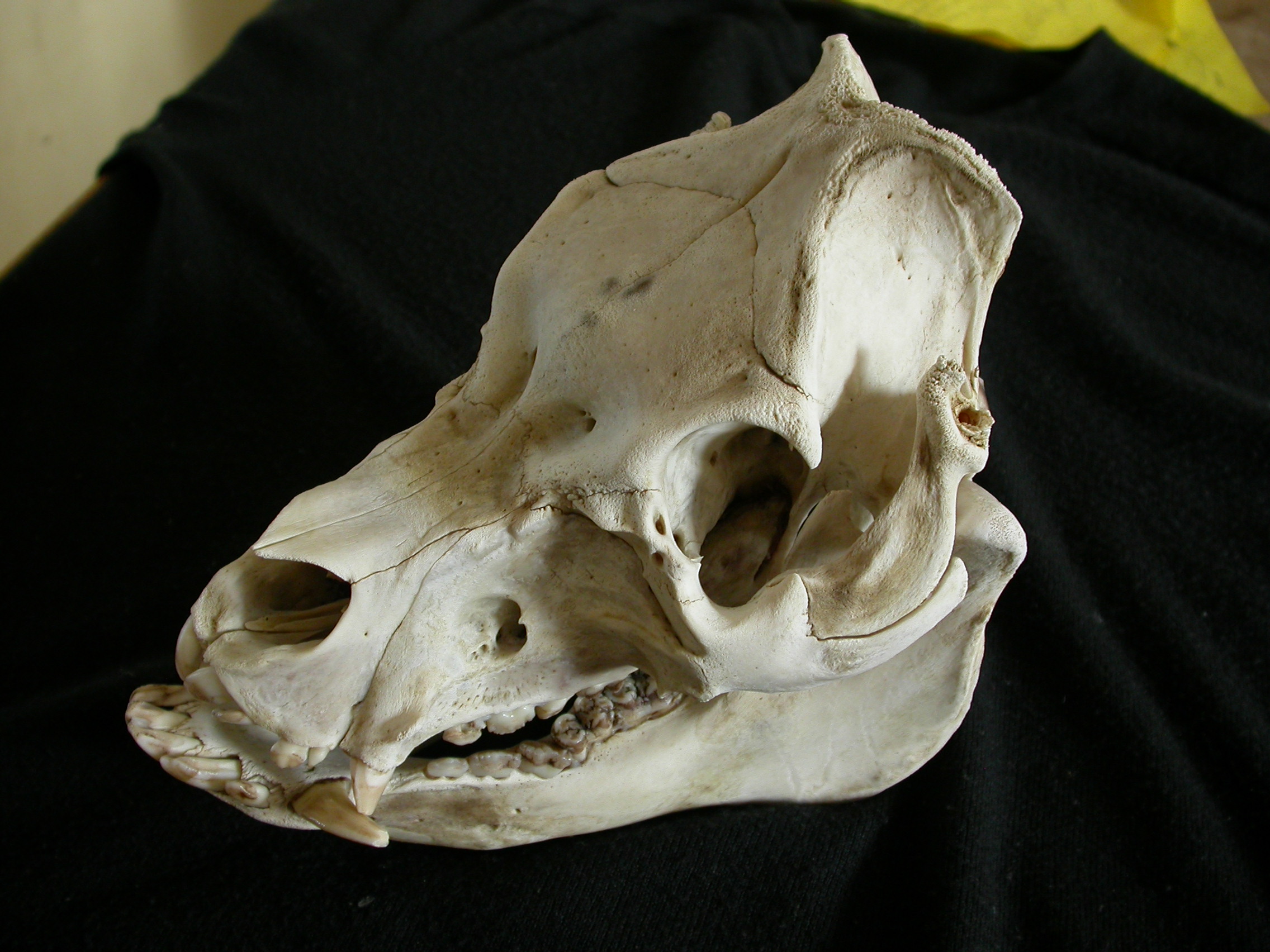|
Schweinemord
In 1915, due to World War I food restrictions and rationing, the German bureaucracy decided to regard pigs The pig (''Sus domesticus''), often called swine, hog, or domestic pig when distinguishing from other members of the genus '' Sus'', is an omnivorous, domesticated, even-toed, hoofed mammal. It is variously considered a subspecies of ''Sus s ... as co-eaters with humans and tried to preserve supplies. As a result, five million pigs were massacred in the so-called Schweinemord (German: pig massacre) to both make food and preserve grain. However it did little to increase the supply of grain, as officials did not take into account the use of pig manure as fertilizer on small farms. Because of this, killing the pigs actually decreased crop yields in the region. References *Roger Chickering: ''Das Deutsche Reich und der Erste Weltkrieg'', C.H.Beck, , P. 5Online*Cove, Dennis and Westwel, Ian ed. ''History of World War I: the Home Fronts, Technologies of the War'', , P. 6 ... [...More Info...] [...Related Items...] OR: [Wikipedia] [Google] [Baidu] |
Agriculture In Germany
In 2021, Germany was the third largest importer and exporter of consumer oriented agricultural products worldwide, and by far the most important European market for foreign producers. The retail market's key characteristics are consolidation, market saturation, strong competition and low prices. Germany is an attractive and cost-efficient location in the center of the EU. While many consumers are very price sensitive, the market also provides many wealthy consumers who follow value-for-money concepts. These consumers are looking for premium quality products and are willing to pay higher prices. Germany still has some of the lowest food prices in Europe, and German citizens spend only about 14 percent of their income on food and beverages. Low food prices are a result of high competition between discounters and the grocery retail sale segment. History Germany's climate has historically favored production of hardy vegetables (like turnips, cabbage and onions), as well as barley which ... [...More Info...] [...Related Items...] OR: [Wikipedia] [Google] [Baidu] |
World War I
World War I (28 July 1914 11 November 1918), often abbreviated as WWI, was one of the deadliest global conflicts in history. Belligerents included much of Europe, the Russian Empire, the United States, and the Ottoman Empire, with fighting occurring throughout Europe, the Middle East, Africa, the Pacific, and parts of Asia. An estimated 9 million soldiers were killed in combat, plus another 23 million wounded, while 5 million civilians died as a result of military action, hunger, and disease. Millions more died in genocides within the Ottoman Empire and in the 1918 influenza pandemic, which was exacerbated by the movement of combatants during the war. Prior to 1914, the European great powers were divided between the Triple Entente (comprising France, Russia, and Britain) and the Triple Alliance (containing Germany, Austria-Hungary, and Italy). Tensions in the Balkans came to a head on 28 June 1914, following the assassination of Archduke Franz Ferdin ... [...More Info...] [...Related Items...] OR: [Wikipedia] [Google] [Baidu] |
Rationing
Rationing is the controlled distribution of scarce resources, goods, services, or an artificial restriction of demand. Rationing controls the size of the ration, which is one's allowed portion of the resources being distributed on a particular day or at a particular time. There are many forms of rationing, although rationing by price is most prevalent. Rationing is often done to keep price below the market clearing, market-clearing price determined by the process of supply and demand in an free market, unfettered market. Thus, rationing can be complementary to incomes policies, price controls. An example of rationing in the face of rising prices took place in the various countries where there was rationing of gasoline during the 1973 energy crisis. A reason for setting the price lower than would clear the market may be that there is a shortage, which would drive the market price very high. High prices, especially in the case of necessities, are undesirable with regard to those ... [...More Info...] [...Related Items...] OR: [Wikipedia] [Google] [Baidu] |
Pigs
The pig (''Sus domesticus''), often called swine, hog, or domestic pig when distinguishing from other members of the genus '' Sus'', is an omnivorous, domesticated, even-toed, hoofed mammal. It is variously considered a subspecies of ''Sus scrofa'' (the wild boar or Eurasian boar) or a distinct species. The pig's head-plus-body length ranges from , and adult pigs typically weigh between , with well-fed individuals even exceeding this range. The size and weight of hogs largely depends on their breed. Compared to other artiodactyls, a pig's head is relatively long and pointed. Most even-toed ungulates are herbivorous, but pigs are omnivores, like their wild relative. Pigs grunt and make snorting sounds. When used as livestock, pigs are farmed primarily for the production of meat, called pork. A group of pigs is called a ''passel'', a ''team'', or a ''sounder''. The animal's bones, hide, and bristles are also used in products. Pigs, especially miniature breeds, are kept as pets ... [...More Info...] [...Related Items...] OR: [Wikipedia] [Google] [Baidu] |
German Empire In World War I
German(s) may refer to: * Germany (of or related to) **Germania (historical use) * Germans, citizens of Germany, people of German ancestry, or native speakers of the German language ** For citizens of Germany, see also German nationality law **Germanic peoples (Roman times) * German language **any of the Germanic languages * German cuisine, traditional foods of Germany People * German (given name) * German (surname) * Germán, a Spanish name Places * German (parish), Isle of Man * German, Albania, or Gërmej * German, Bulgaria * German, Iran * German, North Macedonia * German, New York, U.S. * Agios Germanos, Greece Other uses * German (mythology), a South Slavic mythological being * Germans (band), a Canadian rock band * "German" (song), a 2019 song by No Money Enterprise * ''The German'', a 2008 short film * "The Germans", an episode of ''Fawlty Towers'' * ''The German'', a nickname for Congolese rebel André Kisase Ngandu See also * Germanic (other) * Germa ... [...More Info...] [...Related Items...] OR: [Wikipedia] [Google] [Baidu] |
Rationing By Country
Rationing is the controlled distribution of scarce resources, goods, services, or an artificial restriction of demand. Rationing controls the size of the ration, which is one's allowed portion of the resources being distributed on a particular day or at a particular time. There are many forms of rationing, although rationing by price is most prevalent. Rationing is often done to keep price below the market clearing, market-clearing price determined by the process of supply and demand in an free market, unfettered market. Thus, rationing can be complementary to incomes policies, price controls. An example of rationing in the face of rising prices took place in the various countries where there was rationing of gasoline during the 1973 energy crisis. A reason for setting the price lower than would clear the market may be that there is a shortage, which would drive the market price very high. High prices, especially in the case of necessities, are undesirable with regard to those ... [...More Info...] [...Related Items...] OR: [Wikipedia] [Google] [Baidu] |
Famines In Germany
A famine is a widespread scarcity of food, caused by several factors including war, natural disasters, crop failure, population imbalance, widespread poverty, an economic catastrophe or government policies. This phenomenon is usually accompanied or followed by regional malnutrition, starvation, epidemic, and increased mortality. Every inhabited continent in the world has experienced a period of famine throughout history. In the 19th and 20th century, generally characterized Southeast and South Asia, as well as Eastern and Central Europe, in terms of having suffered most number of deaths from famine. The numbers dying from famine began to fall sharply from the 2000s. Since 2010, Africa has been the most affected continent of famine in the world. Definitions According to the United Nations World Food Programme, famine is declared when malnutrition is widespread, and when people have started dying of starvation through lack of access to sufficient, nutritious food. The Integrated ... [...More Info...] [...Related Items...] OR: [Wikipedia] [Google] [Baidu] |
1915 In Germany
Events in the year 1915 in Germany. Incumbents National level * Kaiser – Wilhelm II * Chancellor – Theobald von Bethmann Hollweg State level Kingdoms * King of Bavaria – Ludwig III of Bavaria * King of Prussia – Kaiser Wilhelm II * King of Saxony – Frederick Augustus III of Saxony * King of Württemberg – William II of Württemberg Grand Duchies * Grand Duke of Baden – Frederick II * Grand Duke of Hesse – Ernest Louis * Grand Duke of Mecklenburg-Schwerin – Frederick Francis IV * Grand Duke of Mecklenburg-Strelitz – Adolphus Frederick VI * Grand Duke of Oldenburg – Frederick Augustus II * Grand Duke of Saxe-Weimar-Eisenach – William Ernest Principalities * Schaumburg-Lippe – Adolf II, Prince of Schaumburg-Lippe * Schwarzburg-Rudolstadt – Günther Victor, Prince of Schwarzburg * Schwarzburg-Sondershausen – Günther Victor, Prince of Schwarzburg * Principality of Lippe – Leopold IV, Prince of Lippe * Reuss Elder Line – Heinrich XXIV, Prince ... [...More Info...] [...Related Items...] OR: [Wikipedia] [Google] [Baidu] |
Regulation In Germany
Regulation is the management of complex systems according to a set of rules and trends. In systems theory, these types of rules exist in various fields of biology and society, but the term has slightly different meanings according to context. For example: * in biology, gene regulation and metabolic regulation allow living organisms to adapt to their environment and maintain homeostasis; * in government, typically regulation means stipulations of the delegated legislation which is drafted by subject-matter experts to enforce primary legislation; * in business, industry self-regulation occurs through self-regulatory organizations and trade associations which allow industries to set and enforce rules with less government involvement; and, * in psychology, self-regulation theory is the study of how individuals regulate their thoughts and behaviors to reach goals. Social Regulation in the social, political, psychological, and economic domains can take many forms: legal restrictio ... [...More Info...] [...Related Items...] OR: [Wikipedia] [Google] [Baidu] |



